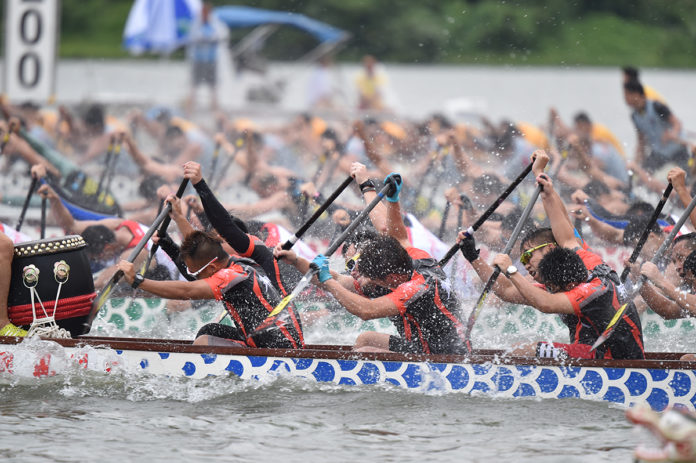Peter Tang Tak Seng, Secretary General of the International Dragon Boat Federation (IDBF), remembers Macau launching its first official races in 2000, and him dipping a toe in the event as a paddler with the Macau China Dragon Boat Association in 2005.
Compared to past editions of the Festival, Mr. Tang points out that the races in Macau are improving in both number and participants from different social sectors including students, private company employees and civil servants.
“Today, the sport has permeated different social sectors,” says Mr. Tang.
Its primary attraction, according to Mr. Tang, is the spirit attached to the sport itself.
To move the boat at high speed, paddlers are required to row at the same punishing speed in total synchronisation.
The Chinese saying of all in one heart describes the exact spirit of rowing a dragon boat, with all paddlers having the same goal of going forward, he notes.
Nevertheless, Mr. Tang says that effort is needed in order to co-ordinate the paddlers’ efforts, and this can train members’ willpower, positively influencing the paddlers.
In recent years, gaming operators have also set up their own teams to join the annual traditional event, seeing the potential positive impact upon their workers.
“It’s because of the spirit of unity, and so these companies also wish to motivate, raise morale and connect with co-workers [who] can be workers from all departments and ranks,” said Tang.
Like most Dragon Boat paddlers, Mr. Tang is a businessman.
He disclosed that even those representing Macau in international Dragon Boat competitions are amateurs.
“As far as I’m aware, there are no professional full-time sports athletes in Macau” asserts Mr. Tang, explaining that unlike countries like the United States or the United Kingdom, Macau has little commercial demand for sports players.

Hit the drum and row!
Two different boats are used in the races – small and standard Dragon Boats.
Generally, there are 18 to 20 paddlers per standard size Dragon Boat and eight to 10 paddlers in the small boat, plus a drummer and a helmsman.
Races feature an open category, as well as competitions for youths, adults and seniors, as well as males, females and mixed groups.
The races this coming weekend, according to the Sports Bureau (ID), will assemble 167 local and overseas teams.
Because of the numerous categories and groups of races, Mr. Tang remarked: “We have very limited time for the international races . . . we also need time to undergo procedures like assemblies, checking documents and equipment. So we can’t perform many races in only one day.”
Reaching out
Mr. Tang has been the Secretary General of the IDBF for four years, with the Federation itself having been established in 1991.
According to Mr. Tang, foreign teams from Indonesia, Thailand, Singapore, the Philippines, Mainland China and even the United States and Canada have traditionally come to Macau to participate in the Dragon Boat Races, with this year’s race no exception.
The International Dragon Boat Race is organised by the Sports Bureau, together with the Macau China Dragon Boat Association, and takes place this weekend and next Tuesday.
Local races will take up the weekends with international races on Tuesday only, when the Dragon Boat Festival is officially celebrated.
An organising committee in charge of the events selects which foreign teams join the races.
“We pick new teams every year so as to make the races improve the reputation of the event and to promote Macau, as well as to act as exchange experiences,” says Mr. Tang, adding that teams from Macau also participate in world championship races in other regions. “Chinese from different Asian regions have deep feelings and attachment to the sport and so the races definitely have an impact on the city, including helping the city’s tourism development.”
In terms of popularity among spectators, Mr. Tang recalls that the venue of the event was only fixed at Nam Van Lake after the East Asian Games were held in Macau in 2005, when the race was an official event.
“With a fixed venue and more seats provided at the Nam Van Lake, more spectators are definitely attracted to watch the racing,” says Mr. Tang, adding that the racing is widely enjoyed by both locals and tourists.
According to the Sports Bureau, some 26,000 spectators were recorded at last year’s event.
Meanwhile, in order to attract more residents to enjoy the racing, the ID has organised cultural displays such as dancing, music, magic and acrobatics as well as Dragon Boat exhibitions, food stalls and stalls selling cultural and creative products. Tang expresses the hope that future promotion of the sport focuses on younger generations, and secondary school students in particular, in order to “allow them to know more about the culture, to build up the spirit of being united and to develop positively.”
—
The legend of Qu Yuan
“[Dragon Boat Racing] has to be related to the legend of Qu Yuan,” says Peter Tang Tak Seng, Secretary General of the International Dragon Boat Federation (IDBF).
The sport itself started 2,000 years ago, he says, when a Chinese poet and Minister named Qu Yuan, who lived during the Warring States of ancient China, had advised the emperor on the politics of an ongoing conflict, resulting in him being framed by other court members and causing him to jump into a river to commit ritual suicide.
Nearby villagers tried to save the poet, paddling out to where he drowned.
According to legend, his death was honoured every year by villagers paddling out to the river, playing drums and throwing food into the river to feed the fish. The food was later developed into zongzi, a traditional Chinese food made of glutinous rice stuffed with different fillings and wrapped in bamboo, reeds or large flat leaves.
























